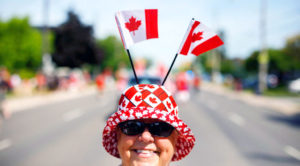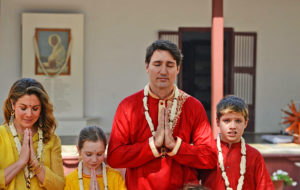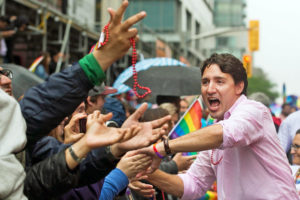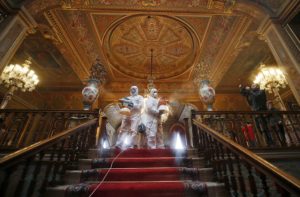The world does not usually pay much attention to Ottawa, Canada’s sleepy capital city. But over the weekend it generated international headlines. A “Freedom Convoy” consisting of anti-vaccine mandate truckers descended on the Canadian parliament to protest cross-border vaccine mandates and what they see as the infringement of their rights. Anti-establishment voices, ranging from Tucker Carlson and Elon Musk to Russell Brand and Donald Trump, all expressed their support.
The story blew up for no other reason than Canadian politics is not usually known for producing unruly sights like this one. While broader Western politics have been marked by rising populist fervour against elites over the last half-decade, Canada has, true to stereotype, remained quiet, contented, bland and unexciting. The patron saint of liberal elites was, after all, re-elected last year and continues to rule over a country that prides itself on its inoffensiveness.
There is every reason to believe that this is how things will remain: the global populist revolution that gave us Trump, Brexit and the gilet jaunes has had a hard time getting a foothold in Canada for structural reasons. It is unlikely that the protesting truckers will have changed many minds, much less public health regulations, or accomplished anything other than increasing traffic congestion in Downtown Ottawa. The industry association representing truckers has disowned them, pointing out that 90% of Canadian truckers are vaccinated, while a recent poll put nationwide popular support for the convoy at a paltry 28%.
Canada’s general incompatibility with populist politics goes back to its roots. Ask an American why the United States was founded and he might say something like: “We had a revolution to secure freedom and government of, by and for the people…” The foundation of Canada was an explicit rebuttal to this notion.
As a country, it was designed to serve as a bulwark against the spectre of revolution and the idiom of popular sovereignty. Its two main political cultures descend from peoples who were defined by their conspicuous non-participation in the great revolutions of the eighteenth century, the American and the French, from which much of the modern rhetoric about liberty, rights, and the will of the people is derived.
Subsequently, the evolution of Canada’s political identity can be thought of less as having a liberal or conservative orientation, but as, quite simply, anti-revolutionary. This means that when change does happen, it is actively managed and mediated by elites at the top rather than brought about by uprisings from below. Though the country has had its own bouts of populism of the Right and Left varieties (and a few failed revolts), it has never been the dominant tradition.
This is because historically, Canada’s elites have proven to be expert not merely at resisting the pressures of revolutionary change but at pre-empting the causes of it.
English Canada was shaped in large part by Loyalist refugees who fled north because they did not want to be a part of the revolutionary experiment of 1776. Disavowing Yankee radical individualism and republicanism, the colonies that would become Canada were suspicious of mass democracy, more deferential to authority, and more mindful of communal obligations: they were said to be “more Tory than the King” and their progeny retained the so-called “Tory touch”.
Canada’s first prime minister, Sir John A. Macdonald, looked south of the border with horror (as many Canadians do now) at the chaos of the American Civil War and vowed to establish a strong central government that would have unquestioned supremacy over its constituent provinces. Thus, modern Canada was born in 1867 with the motto “peace, order and good government” — a somewhat authoritarian-sounding reply to “life, liberty and the pursuit of happiness”.
French Canada is different but the same. Its people are the descendants of pious habitant colonists who were insulated from the influence of the Jacobin revolution across the Atlantic by the British conquest of Quebec in the Seven Years War.
Macdonald’s chief French Canadian ally, Sir George-Étienne Cartier, claimed that despite the trauma of defeat, the conquest was actually a blessing in disguise sent by Providence to save French Canada “from the misery and shame of the French Revolution”. The Ancien Régime, with its spirit of conformity and obedience to Catholic orthodoxy, lived on in Quebec until the Sixties, when secular nationalism replaced Catholicism as the de facto state religion.
In that decade, Canada would prove yet again that it was the anti-revolutionary country par excellence. While American cities burned in riots over race and the Vietnam war, Canadians smugly congratulated themselves for living in “the peaceable kingdom”. When, in 1968, the streets of Paris, Chicago and Prague were racked with revolutionary violence, Canada witnessed a peaceful transition of power to the new generation as embodied by a charismatic action-intellectual named Pierre Trudeau, who unlike LBJ, Nixon or De Gaulle, was definitely with it.
The first Trudeau’s rise to power, much like the second, was greeted by fawning crowds and adoring fangirls: it took on the feel of a Beatles tour and was dubbed “Trudeaumania”. What might have looked like a spontaneous democratic outpouring was actually the result of backroom dealing by ruling party elites, who recruited Trudeau and practically fast-tracked him to the premiership: Canada’s own Ancien Régime had found a way to adapt itself to the Age of Aquarius.
Trudeau’s chief task was to keep Canada together in the face of Quebec separatism. With the exception of the brief terrorist October Crisis of 1970, which Trudeau met with heavy-handed repression, his 16 years in power were marked by vigorous but non-violent political debate culminating in the 1980 Quebec independence referendum. Unlike other interethnic hotspots, say Northern Ireland or the Balkans, Canada resolved its divisions through the ballot box — and through occasionally heated but mostly boring conferences where elites could hash things out.
Fast forward to the second Trudeau. The world is once again living through revolutionary times. But Canada seems to be immune. US or UK conservatives might look at the insufferably progressive rhetoric of Justin Trudeau and wonder why ordinary Canadians haven’t tossed him out in favour a more populist alternative. Have they all been brainwashed up there?
Yet once again, like Macdonald and Trudeau Sr. before him, Justin Trudeau is the face of a Machiavellian elite that can maintain itself in power by diffusing and pre-empting the pressures of revolutionary change. Looking past the often-deceptive rhetoric and surface-level imagery, one will see that Canada is not nearly as liberal, progressive or cosmopolitan as it is perceived.
Trudeau Jr, like his father, is a promoter of official multiculturalism and is fond of uttering slogans like “diversity is our strength”. But as Canadian philosopher Joseph Heath has pointed out, unlike the United States, the Canadian government “does not engage in race-based classification of citizens [just as] the census does not impose racial categories”.
And though Canadian universities are prone to indulging in critical theory jargon — as a certain University of Toronto psychology professor will be able to tell you — Canada has nothing like the American policy of “affirmative action” or race-based admission quotas, which is the source of interminable racial and ethnic animus in the US.
When it comes to immigration, Trudeau has been depicted by both liberal fans and conservative critics abroad as a bleeding-heart advocate of open borders. But look at Canada’s actual immigration system; in many ways, it is far more stringent than the US immigration system was under Trump. Canada may not have a border wall but it has a ruthlessly efficient “bureaucratic wall,” in addition to having invented the famous “points system”, emulated by Australia, and now the UK.
What shocks, particularly from the American vantage point, is that Canada has its own version of “mandatory E-Verify”, an employment verification policy for the purposes of immigration enforcement. In the United States the measure is usually only advocated for by hard immigration restrictionists. Not even Trump (for understandable reasons) and the Republican establishment are willing to support it.
The drivers of Right-wing populism — divisive racial preferentialism, permissive immigration policy, a widespread sense of the loss of control — are thus not present in Canada. In other countries, pandemic restrictions may have been the straw that broke the camel’s back, the latest in a long line of elite excesses that long predated Covid-19.
But in Canada, whatever the policy on restrictions or vaccine mandates, absent those other factors, the camel’s back is not nearly so overburdened. Save for in the perpetually dissatisfied energy-producing region out west, populism will remain a hard sell. It is simply not favoured by Canada’s political culture.
This is not to say that the truckers are “un-Canadian” as their liberal opponents will paint them, though the decision by some of them to carry Confederate and “Don’t Tread on Me” flags does not help — nor does desecrating the National War Memorial. Shameful hooliganism aside, there is a place for dissenters in what is still (contrary to their cries of “tyranny”) a free country.
They will just have to accept that they are up against one of the most entrenched and hegemonic ruling classes anywhere in the Western world: the “Laurentian elites” and their instrument for wielding power, the Liberal Party. As veteran journalist Peter C. Newman once observed, they have “reigned longer over Canada than … Communists ruled Russia”. If the Freedom Convoy is looking to overthrow this regime, they will have a very long drive ahead.
Disclaimer
Some of the posts we share are controversial and we do not necessarily agree with them in the whole extend. Sometimes we agree with the content or part of it but we do not agree with the narration or language. Nevertheless we find them somehow interesting, valuable and/or informative or we share them, because we strongly believe in freedom of speech, free press and journalism. We strongly encourage you to have a critical approach to all the content, do your own research and analysis to build your own opinion.
We would be glad to have your feedback.
Source: UnHerd Read the original article here: https://unherd.com





